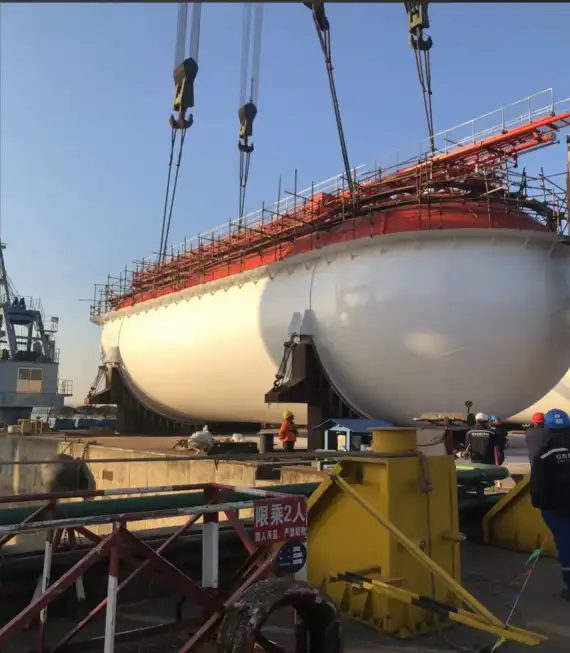Key Factors in CHS Selection Process
The selection of an appropriate Cargo Handling System involves careful consideration of several crucial factors. Understanding these elements is essential for making an informed decision that aligns with your vessel's operational needs and long-term business objectives.
Vessel Type and Cargo Specifications
Different vessel types have unique requirements for their cargo handling systems. For instance, liquefied gas carriers need specialized CHS designs to manage pressurized or refrigerated cargoes safely. The specific characteristics of the cargo, such as its physical properties, temperature requirements, and chemical compatibility, play a significant role in determining the most suitable CHS.
Operational Requirements
Consider the operational demands of your vessel, including loading and unloading frequencies, cargo transfer rates, and the need for simultaneous handling of multiple cargo types. A CHS should be capable of meeting these operational requirements efficiently while maintaining the highest safety standards.
Regulatory Compliance
Adherence to international maritime regulations and safety standards is paramount when selecting a CHS. Ensure that the chosen system complies with relevant guidelines set by organizations such as the International Maritime Organization (IMO) and classification societies.
Matching CHS to Your Vessel's Specific Needs
To maximize the benefits of your Cargo Handling System, it's crucial to align the CHS capabilities with your vessel's unique requirements. This process involves a thorough analysis of your operational profile and future business projections.
Capacity and Performance Analysis
The first step in aligning your CHS with your vessel’s needs is evaluating its capacity relative to the cargo carrying capacity and desired loading/unloading rates of the vessel. The system must be capable of managing peak operational demands without compromising safety or operational efficiency. An in-depth analysis will help ensure that the CHS is not only sufficient for current needs but also scalable for future demands, enabling smooth operations during high-traffic periods or in challenging conditions.
Flexibility and Adaptability
As operational routes and cargo types may evolve, it is important to consider the adaptability of the CHS. A system that is flexible enough to accommodate various cargo types or can be easily upgraded provides long-term value. This adaptability reduces the likelihood of needing costly replacements in the future and ensures that your vessel can remain competitive in a changing market, effectively managing new and diverse cargo requirements.
Integration with Existing Systems
Another crucial aspect is how well the CHS integrates with your vessel’s existing infrastructure, including monitoring, control systems, and operational processes. Seamless integration not only enhances the overall efficiency of the cargo handling operations but also simplifies the training requirements for your crew. A well-integrated system ensures that the vessel operates smoothly, with fewer chances for errors, reducing downtime and improving overall productivity.
Cost vs. Efficiency: Balancing Your CHS Choice
While the initial cost of a Cargo Handling System is an important consideration, it's crucial to evaluate the long-term efficiency gains and potential cost savings that a well-designed CHS can offer.
Life Cycle Cost Analysis
A thorough life cycle cost analysis is essential to understand the total cost of ownership. This analysis should extend beyond the initial purchase price and take into account maintenance costs, energy efficiency, and potential downtime for repairs. Often, a higher upfront investment in a more reliable, quality CHS can result in significant savings over the system's operational life. By reducing maintenance frequency, energy consumption, and minimizing repair-related downtime, the total cost of operation may be considerably lower than with cheaper alternatives.
Efficiency Metrics
When evaluating different CHS options, it is important to assess key efficiency metrics such as cargo transfer rates, energy consumption, and automation capabilities. A system with higher operational efficiency can lead to faster turnaround times at ports, reducing idle time and increasing throughput. In the long run, this improved efficiency helps lower operational costs, thereby boosting the overall profitability of the vessel's operations.
Support and Service Availability
Another key factor to consider is the availability of technical support, spare parts, and maintenance services from the CHS provider. Reliable support and quick access to essential services help minimize downtime, ensuring that your system remains operational and efficient throughout its life. The availability of local or responsive service teams can prevent delays, reduce maintenance costs, and extend the lifespan of the CHS, ultimately protecting your investment.
In conclusion, selecting the right Cargo Handling System requires a balanced approach that considers your vessel's specific needs, operational requirements, and long-term business goals. By carefully evaluating these factors and partnering with experienced providers, you can make an informed decision that enhances your vessel's performance and competitiveness in the maritime industry.
For vessel operators seeking cutting-edge Cargo Handling Systems tailored to their specific needs, CM Energy offers innovative solutions backed by years of industry expertise. Our advanced CHS designs, developed in partnership with leading Norwegian firm WTC, cater to a wide range of vessel types, including Very Large Gas Carriers (VLGCs), chemical tankers, and LNG bunkering vessels. With a focus on safety, efficiency, and regulatory compliance, CM Energy's Cargo Handling Systems are designed to optimize your vessel's performance and drive long-term operational success. Contact us today at info.cn@cm-energy.com to discuss how our tailored CHS solutions can elevate your maritime operations.
References
- International Maritime Organization. (2022). Guidelines for Cargo Handling Systems on Ships.
- Johnson, M. (2021). Advancements in Marine Cargo Handling Technologies. Maritime Engineering Journal, 45(3), 78-92.
- Smith, R. & Brown, L. (2023). Optimizing Vessel Performance through Efficient Cargo Handling Systems. Journal of Naval Architecture and Marine Engineering, 18(2), 205-220.
- Thompson, K. (2022). Safety Considerations in Modern Cargo Handling System Design. International Journal of Maritime Safety, 9(4), 317-330.
- Wilson, J. (2023). Cost-Benefit Analysis of Advanced Cargo Handling Systems in Commercial Shipping. Maritime Economics & Logistics, 25(1), 42-58.
- Zhang, L. & Lee, S. (2022). Regulatory Compliance and Innovation in Marine Cargo Handling: A Global Perspective. Marine Policy, 136, 104-118.

